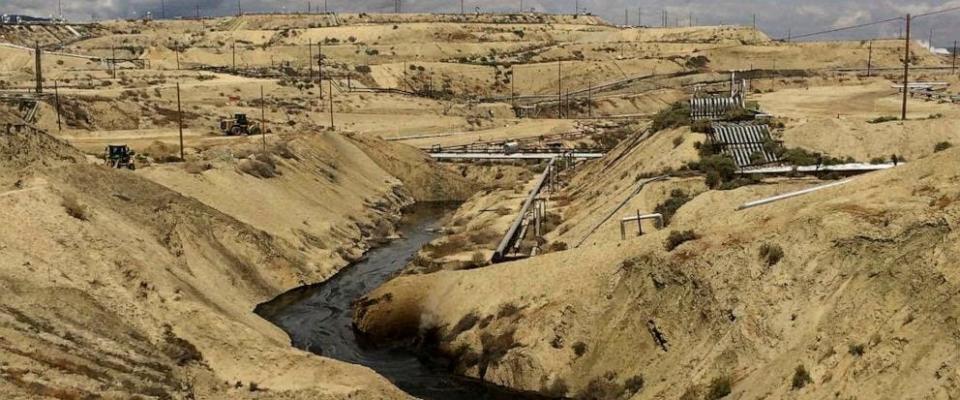Oil companies may face larger fines, beefed up enforcement under new law
- Oops!Something went wrong.Please try again later.
A new law designed to strengthen California's enforcement powers against petroleum companies who cause major oil spills or other hazards was signed by Gov. Gavin Newsom on Saturday. But a major oil spill is still running, the state's oil regulator admitted in an email about the new law, 20 years after it was first reported, and it's unclear if Chevron is still profiting off the crude, or ever paid a $2.7 million fine.
Assembly Bill 631 was authored in response to a Desert Sun and ProPublica probe that found the state agency charged with regulating fossil fuel companies had a spotty enforcement record, and had collected zero fines in 2020 despite amped up penalty powers.
The law, authored by Assemblymember Gregg Hart, D-Santa Barbara, increases penalties to as much as $70,000, and gives state regulators new abilities to request criminal enforcement against oil companies who fail to follow the law.
“This measure ensures California has 21st century enforcement tools to protect communities from oil operators that violate the law, endanger public health, and threaten the environment,” Hart said. “AB 631 will strengthen compliance and deter the pattern of treating violations as the cost of doing business. I applaud Governor Newsom for signing this significant legislation.”
In addition to higher civil penalties, AB 631 empowers California’s oil regulator, the California Geologic Energy Management Division (CalGEM), to refer cases to local prosecutors, and to seek injunctive relief from a Superior Court to compel operators to correct violations that, if persistently neglected, can deteriorate into worsening conditions that threaten public health, safety, and the environment. The oil and gas supervisor, who heads CalGEM, can also for the first time recover all response, prosecution and enforcement costs.

As of this week, it is still impossible for the public to determine if a $2.7 million fine against Chevron for a 2019 oil spill that was the state's largest in decades, or assessed penalties against other oil companies in past years were ever paid, despite vows by officials presented with those findings to improve enforcement transparency. Chevron had protested the fine, saying there was no safety threat, despite the death of one of its own workers in a similar spill in 2011.
In an unsigned email, CalGEM's public affairs office said the agency has collected nearly $1.2 million for 24 civil penalty orders in 2022-23. But the office did not answer whether Chevron had paid any or all of the penalty for the 2019 spill, known as a "surface expression" because raw crude shoots straight out of the ground.
Oil spill still not stopped five years later
A related spill on a Chevron oil field nearby is also still running five years later, the agency admitted, though it said Chevron’s "mitigation program" has reduced it by 99%. The Desert Sun and ProPublica also found that rather than stopping such oil spills, CalGEM allowed companies to scoop up the spilled oil and process it for sale. The Chevron spill, which was first reported in 2003, and which had already spewed more crude than the Exxon Valdez tanker that ran aground in Alaska, had earned Chevron an estimated $11.6 million from 2016 to 2019.
In Tuesday's email, CalGEM said of the new law, "The possibility of fines and other enforcement actions is a powerful motivator for operators to address issues that CalGEM inspectors have identified. Our focus is on ensuring safe, clean operations that safeguard the environment through strong regulation of oil and gas operations."
Hart's office pointed to the news outlets' findings in a press release, and a spokesman said they prompted the Assemblymember and fellow legislators to act.
"In 2020, CalGEM issued over $190,000 in civil penalties and failed to collect a single dollar. AB 631 is an important step forward to deter bad actors, and ensure CalGEM has the tools to hold oil operators accountable," Hart's office said in a news release.
A county prosecutor and environmental groups cheered the news that Newsom had signed the bill and thanked Hart.
“I would like to thank Assemblymember Hart for sponsoring this important environmental legislation. The people of Santa Barbara County care deeply about protecting the environment and the natural beauty which we are fortunate enough to enjoy every day,” said John Savrnoch, district attorney for Santa Barbara County. “AB 631 will provide the DA’s Office with additional tools to help prevent harm to our environment and to hold polluters accountable for the damage they cause.”
“This legislation is important to protect the public from bearing the cost of illegal activities by oil andgas companies,” said Linda Krop, chief counsel for the Environmental Defense Center.
“AB 631 will ensure that oil companies that violate the law are held accountable for endangeringcommunities and that our environment and public health are valued over profits” said Fatima Iqbal-Zubair with the California Environmental Voters
Janet Wilson is senior environment reporter for The Desert Sun and a Stanford Bill Lane Center Western Media Fellow.
This article originally appeared on Palm Springs Desert Sun: Oil companies may face larger fines, beefed up enforcement under new law

